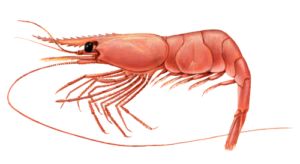Minnesota, Land of 10,000 Lakes and One Shrimp Farm?
 Minnesota has lots of water, but all of it is fresh. Shrimp live in salt water, of which Minnesota has none. So the state has never been associated with shrimp, or shrimp production. Until now. As Tom Steward noted a couple of weeks ago, legislation is wending its way through Minnesota’s House and Senate that would subsidize shrimp production facilities in the state. The subsidy would be 69 cents per pound of shrimp; in addition, shrimp production facilities would be exempt from sales and use taxes.
Minnesota has lots of water, but all of it is fresh. Shrimp live in salt water, of which Minnesota has none. So the state has never been associated with shrimp, or shrimp production. Until now. As Tom Steward noted a couple of weeks ago, legislation is wending its way through Minnesota’s House and Senate that would subsidize shrimp production facilities in the state. The subsidy would be 69 cents per pound of shrimp; in addition, shrimp production facilities would be exempt from sales and use taxes.
It’s no secret what is going on: a businessman near Marshall wants to grow shrimp, and he has persuaded his local legislators to try to obtain government funding for his project. There are several things wrong with this picture:
1) Hundreds or thousands of small businesses are starting up across Minnesota. Why should the state single out one of them, at the expense of the others, for millions of dollars in subsidies? Best case, it’s unfair. Worst case, other businesses conclude they are missing out and besiege the legislature for subsidies for their projects.
2) It seems unlikely that shrimp production in Minnesota is a good idea. Minnesota has zero natural advantages in that business; anyone could put up a building, anywhere in the country, and do the same thing. So it seems probable that the shrimp farm will experience the same fate as Hibbing’s chopsticks factory, which survived for two years at a cost of $3 million in taxpayer dollars.

3) But perhaps that is wrong. Maybe growing shrimp in Minnesota is a great idea. If so, the owners should do what other small businessmen do: either find investors, or get a bank loan. The problem, of course, is that investors want a piece of the action, and banks expect to be repaid. Taxpayer dollars are ideal: if the project fails, the taxpayers bear the loss.
4) Note that the sponsors of the shrimp subsidy bill in both the House and the Senate are Republicans. This illustrates an important point: Electing Republicans is not the same thing as electing conservatives, and a Republican legislature does not guarantee sound fiscal policy. Republicans, like Democrats, are often tempted to try to advance local business interests at the expense of the rest of the state. The only cure for foolish subsidies–whether we are talking about a small shrimp business or a vastly worse boondoggle like Southwest Light Rail Transit–is sound conservative principles.
Yesterday, I recorded our Monday three-minute segment with the Rookie on KSTP radio on the subject of the shrimp subsidy. It is pretty entertaining, I think:
.